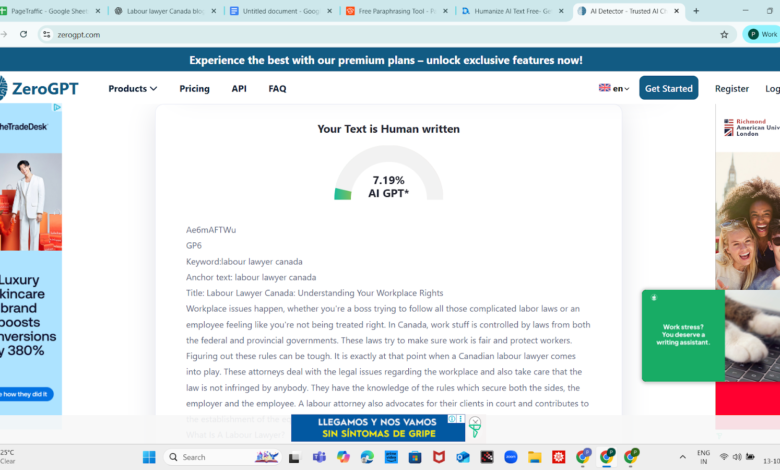Labour Lawyer Canada: Understanding Your Workplace Rights

Workplace issues happen, whether you’re a boss trying to follow all those complicated labor laws or an employee feeling like you’re not being treated right. In Canada, work stuff is controlled by laws from both the federal and provincial governments. These laws try to make sure work is fair and protect workers.
Figuring out these rules can be tough. It is exactly at that point when a Canadian labour lawyer comes into play. These attorneys deal with the legal issues regarding the workplace and also take care that the law is not infringed by anybody. They have the knowledge of the rules which secure both the sides, the employer and the employee. A labour attorney also advocates for their clients in court and contributes to the establishment of the equitable treatment of the staff in the company.
What Is A Labour Lawyer?
A labour lawyer in Canada is someone who works on matters that concern the workers, the employers, and the unions. They are often mixed up with the employment lawyers, but these two are not the same. Labour lawyers are usually involved in union-related issues, such as negotiating and conflicts between the companies and unions. In contrast, employment lawyers provide assistance to the staff outside the unions with such troubles as sexual harassment in the workplace, disputes over contracts, or unjust termination. Because oftentimes labour and employment laws are intertwined, it is common for lawyers in Canada to work in both areas.
The Scope Of Labour Law In Canada
The labour system in Canada is regulated by two levels of law. The federal government has its own set of rules, including the Canada Labour Code, which governs various economic sectors such as banking, telecommunications, and air travel. Provincial rules like the Labour Relations Act in Ontario and the Employment Standards Code in Alberta are mainly directed to the majority of workers.
Among others, these regulations deal with the following main topics:
- Minimum wage requirements
- Working time and overtime policies
- Right to collective bargaining
- Layoffs and dismissals procedures
Different labour laws in each province, thus it is always advisable to consult with a lawyer well-versed in the rules governing your area.
See also: Legal Update 100 Day Dream Home Lawsuit Update Today
What Does A Labour Lawyer Do?
Labour attorneys are a significant picture in the workplace relation side. They take care of the main points that are written below:
1. Union and Collective Bargaining Matters
Labour attorneys mediate for both sides in making the contracts through bargaining, these agreements determine the salaries, working hours, benefits and conditions for the workers who belong to the unions. Besides that, they also assist in settling disputes if there are strikes, lockouts or complaints regarding unfair labour practices at the board.
2. Wrongful and Unjust Dismissal
In case an employee is fired without any good reason or is not given a notice period, a labor attorney can assess and file for compensation. He/she can also engage in negotiating the severance package or reinstatement, whichever is appropriate under the circumstances.
3. Workplace Harassment and Discrimination
Workers who are subjected to adverse treatment on grounds of gender, colour, disability or any other characteristic that is protected under human rights legislation can pursue redress in the courts. Labour lawyers support clients in every step of the complaint process, including through human rights tribunals.
4. Compliance and Policy Development
Labour lawyers are those professionals who do trustable advice for employers in decision-making on developing or assuring workplace policy, this means all policies that employers may have from anti-harassment to health and safety to be in accordance with the federal and provincial laws.
5. Workplace Investigations
At the time of the misconduct or unlawful behaviour, the lawyers may either go ahead with the conduction or serve as an advisor for the internal investigation of the company, where the whole procedure is going to be fair and legally acceptable.
How Labour Lawyers Help Employers
To make sure their business practices adhere to the Canadian labour standards, employers usually get the help of labour lawyers. A lawyer’s involvement can be through:
- Creating employment contracts and office regulations that are legal.
- Giving guidance in the course of collective bargaining or union discussions.
- Handling layoff processes in a way that eliminates the possibility of wrongful dismissal lawsuits.
- Being the company’s representative in labour board hearings or disputes.
Proactive employers, in turn, are able to minimize legal risks and have smooth and positive relationships with their employees.
How Labour Lawyers Help Employees
Workers get a voice and a strategy through labour lawyers in the midst of difficult and complicated workplace issues. They assist employees in the following ways:
- Know their legal rights according to Canadian labour law.
- Make the company or employer aware of the grievance against them or their unfair treatment through formal complaints.
- Get fair severance or settlements after termination.
- Aim for justice in cases of harassment or discrimination.
To sum up, labour lawyers help individual workers confront and deal with the larger corporate entities.
Faqs
1. What is the fee of a labour lawyer in Canada?
- The majority of them charge hourly rates between $250 and $600, based on their proficiency and location. A few might even have options like flat-fee consultations or billing according to the outcome of a case.
2. Is it possible to take care of a labour conflict without a lawyer?
- It is possible but not wise. The complexity of labour law makes it very hard for an unrepresented party to win; hence, it is advisable always to have a lawyer represent you.
3. What are the distinctions between labour law and employment law?
- Labour law is concerned with the rights and duties of the employees and the employer in a unionized setting while employment law includes all the rights and obligations of the employee and the employer in a non-unionized setting.
4. Which labour laws should I follow?
- If your job is in a sector that is regulated by the federal government, the Canada Labour Code will be applicable. If not, then your provincial employment laws apply.
5. Do you think labour attorneys can also represent clients who experience harassment issues?
- Indeed they can. Labor attorneys provide assistance in cases of harassment and discrimination based on human rights legislation as well as in the frame of the company’s policies.
A labour lawyer ensures that your employee rights, resolution of disputes in union, and compliance of your actions are all within the law.
Conclusion
A labour lawyer in Canada is not just a legal adviser, but a protector of fairness in the workplace. Through their guidance, negotiation, and representation, they help to build a work environment that is balanced, respectful, and legally sound, which is a hallmark of the strong labour system in Canada.





